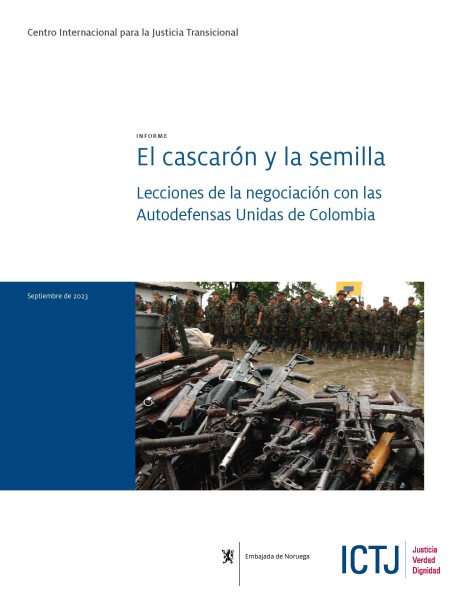We work side by side with victims to obtain acknowledgment and redress for massive human rights violations, hold those responsible to account, reform and build democratic institutions, and prevent the recurrence of violence or repression.
The Shell and the Seed: Lessons from the Negotiation with the United Self-Defense Forces of Colombia
This study presents reflections on the peace negotiations between the Colombian government and the United Self-Defense Forces of Colombia between 2003 and 2006. It seeks to contribute to strategies for negotiating with or subduing illegal armed groups, as well as for the general pursuit of total peace underway today in Colombia.

The achievement of total peace is not a new goal for Colombia. For the better part of the last 30 years, most government administrations have attempted to negotiate or subdue all existing armed groups either simultaneously or sequentially. However, the results so far have been partial and insufficient to address the structural causes and persistent factors behind a 60-year internal armed conflict.
The product of a collaboration between ICTJ and the researcher, journalist, and former commissioner of the Colombian Truth Commission, Marta Ruiz, this study presents new points of view and reflections on the negotiations with the paramilitary forces in the first years of 2000. These reflections can be useful not only to inform public debate but also as input for decisionmakers and those who design strategies for negotiation and the pursuit of total peace underway today in Colombia.
The first part explains the genesis of the United Self-Defense Forces of Colombia (AUC) and describes their transition from drug traffickers to political and military actors. It presents evidence that since the 1980s the Colombian state has attempted to negotiate with drug traffickers using different narratives about their nature.
The second part describes what happened at the Santafé Ralito negotiation table, the discussion’s agenda, and how the political context affected the process. It also shows how political timing, in particular President Uribe's reelection, affected the process’s outcome. The big question it asks, one with no single answer, is why, if negotiations were being held with drug traffickers, there was no real talk of dismantling drug trafficking.
The third part assesses the consequences of the process, both in terms of justice and reintegration. It attempts to explain how the demobilized armed groups were reactivated in the territories.